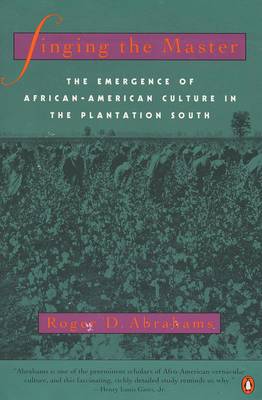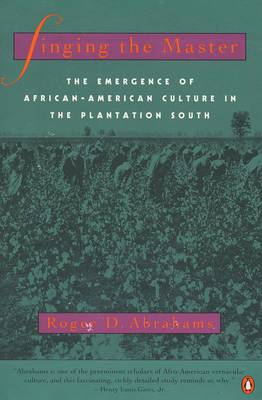
En raison d'une grêve chez bpost, votre commande pourrait être retardée. Vous avez besoin d’un livre rapidement ? Nos magasins vous accueillent à bras ouverts !
- Retrait gratuit dans votre magasin Club
- 7.000.000 titres dans notre catalogue
- Payer en toute sécurité
- Toujours un magasin près de chez vous
En raison de la grêve chez bpost, votre commande pourrait être retardée. Vous avez besoin d’un livre rapidement ? Nos magasins vous accueillent à bras ouverts !
- Retrait gratuit dans votre magasin Club
- 7.000.0000 titres dans notre catalogue
- Payer en toute sécurité
- Toujours un magasin près de chez vous
Singing the Master
The Emergence of African-American Culture in the PlantationSouth
Roger D Abrahams
Livre broché | Anglais
39,95 €
+ 79 points
Description
"Impressive...A scrupulously researched work enlarging our understanding of an integral aspect of slave culture."--The Washington Post Book World What was it like to be a slave on a plantation of the antebellum South? How did the fiction of the happy slave and myth of the plantation "family" evolve? How did slaves create a performance style that unified them, while simultaneously entertaining and mocking the master? The answers to these questions may be found in the groundbreaking study of the corn-shucking ceremonies of the prewar South, where white masters played host to local slaves and watched their "guests" perform exuberant displays of singing and dancing. Drawing on the detailed written and oral histories of masters, slaves, and Northern commentators, distinguished folklorist Roger Abrahams peels through layers of racism and nostalgia surrounding this celebration to uncover its true significance in the lives and imagination of both blacks and whites - and in the evolution of an enduring African-American culture.
Spécifications
Parties prenantes
- Auteur(s) :
- Editeur:
Contenu
- Nombre de pages :
- 384
- Langue:
- Anglais
Caractéristiques
- EAN:
- 9780140179194
- Date de parution :
- 01-01-94
- Format:
- Livre broché
- Format numérique:
- Trade paperback (VS)
- Dimensions :
- 131 mm x 203 mm
- Poids :
- 381 g

Les avis
Nous publions uniquement les avis qui respectent les conditions requises. Consultez nos conditions pour les avis.






